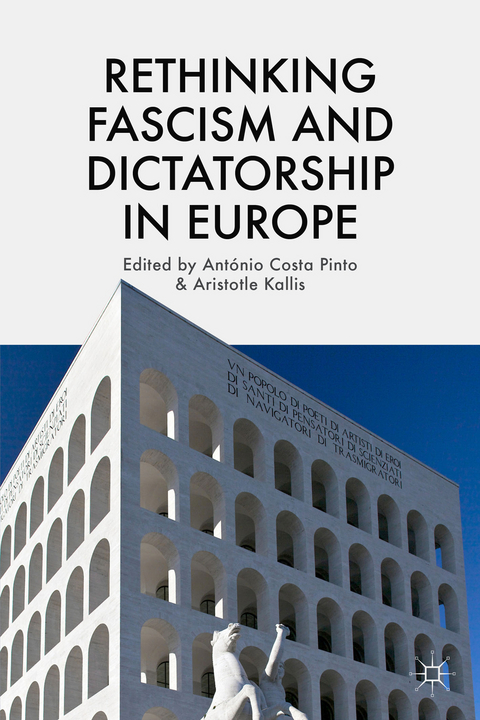
Rethinking Fascism and Dictatorship in Europe
Palgrave Macmillan (Verlag)
978-1-137-38440-9 (ISBN)
Fascism exerted a crucial ideological and political influence across Europe and beyond. Its appeal reached much further than the expanding transnational circle of 'fascists', crossing into the territory of the mainstream, authoritarian, and traditional right. Meanwhile, fascism's seemingly inexorable rise unfolded against the backdrop of a dramatic shift towards dictatorship in large parts of Europe during the 1920s and especially 1930s. These dictatorships shared a growing conviction that 'fascism' was the driving force of a new, post-liberal, fiercely nationalist and anti-communist order. The ten contributions to this volume seek to capture, theoretically and empirically, the complex transnational dynamic between interwar dictatorships. This dynamic, involving diffusion of ideas and practices, cross-fertilisation, and reflexive adaptation, muddied the boundaries between 'fascist' and 'authoritarian' constituencies of the interwar European right.
Goffredo Adinolfi, Lisbon University Institute, Spain Gerhard Botz, University of Vienna, Italy Roger Eatwell, University of Bath, UK Roger Griffin, Oxford Brookes University, UK Constantin Iordachi, Central European University, Budapest Javier Luque, University of Granada, Spain Miguel Jerez Mir, University of Granada, Spain Mogens Pelt, University of Copenhagen, Denmark David D. Roberts, University of Georgia, USA Jason Wittemberg, University of California, Berkeley, USA
PART I: THEORETICAL AND COMPARATIVE PERSPECTIVES 1. The 'Fascist Effect': On the Dynamics of Political Hybridisation in Interwar Europe; Aristotle Kallis 2. Fascism and the Framework for Interactive Political Innovation During the Era of the Two World Wars; David Roberts 3. The Nature of 'Generic Fascism': Complexity and Reflexive Hybridity; Roger Eatwell 4. Fascism, Corporatism and the Crafting of Authoritarian Institutions in Interwar European Dictatorships; Antonio Costa Pinto PART II: CASE-STUDIES 5. The Coming of the Dollfuss/Schuschnigg Regime and the Stages of its Development; Gerhard Botz 6. Salazar's 'New State'. The Paradoxes of Hybridization in the Fascist Era; Goffredo Adinolfi and Antonio Costa Pinto 7. State and Regime in Early Francoism (1936-45): Power Structures, Main Actors and Repression Policy; Miguel Jerez Mir and Javier Luqu 8. Stages in the Development of the 'Fourth of August' Regime in Greece; Mogens Pelt 9. External Influences on the Evolution of Hungarian Authoritarianism, 1920- 1944; Jason Winterberg 10. A Continuum of Dictatorships: Hybrid Totalitarian Experiments in Romania, 1937-1944; Constantin Iordachi CONCLUSION Embracing Complexity and Transnational Dynamics: The Diffusion of Fascism and the Hybridization of Dictatorships in Interwar Europe
| Zusatzinfo | XXVII, 317 p. |
|---|---|
| Verlagsort | Basingstoke |
| Sprache | englisch |
| Maße | 155 x 235 mm |
| Themenwelt | Geschichte ► Allgemeine Geschichte ► 1918 bis 1945 |
| Geisteswissenschaften ► Geschichte ► Geschichtstheorie / Historik | |
| Geisteswissenschaften ► Geschichte ► Regional- / Ländergeschichte | |
| Sozialwissenschaften ► Politik / Verwaltung ► Politische Systeme | |
| Sozialwissenschaften ► Politik / Verwaltung ► Politische Theorie | |
| ISBN-10 | 1-137-38440-9 / 1137384409 |
| ISBN-13 | 978-1-137-38440-9 / 9781137384409 |
| Zustand | Neuware |
| Haben Sie eine Frage zum Produkt? |
aus dem Bereich


